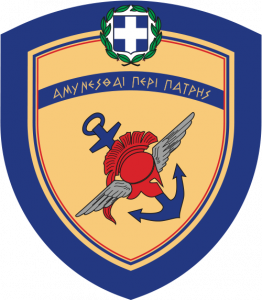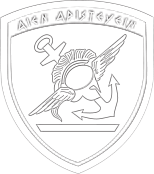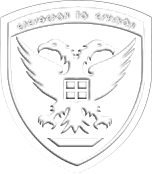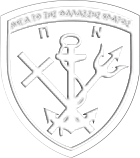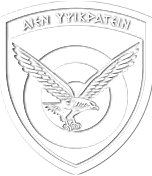The National Defence of Greece is planned, determined and implemented in the framework of a broad institutional, political and military concept, which consists of the following:
The Permanent Committee of National Defence and Foreign Affairs of the Parliament, which is responsible for the processing, examination and voting of the bills of law and law suggestions, concerning the Ministry of Defence.
The Governmental Council on Foreign Policy and National Defence (KYSEA), of which president is the Prime Minister, is considered to be the main decision making body concerning National Defence issues, such as the Policy of National Defence, structure and leadership of the Armed Forces, major procurement and production programs of defence means and equipment, the Crisis Management System and the development of the Armed Forces in order to cover the needs of the country.
The Ministry of Defence (MOD). It is the governmental institution through which the organizational framework of the Armed Forces’ administration is being reflected.
The main organs of MOD, which contribute to the formation and implementation of the National Military Strategy and control the Armed Forces, are the following:
- The Minister of Defence.
- The Deputy Minister or Ministers of National Defence.
- The General Secretary of Ministry of National Defence.
- The Council of Defence.
- The Joint Chiefs of General Staffs Council.
- The Chief/ Hellenic National Defence General Staff.
- The Higher Councils of the Services of the Armed Forces (Higher Naval Council- Higher Air Council- Higher Military Council).
- The Chiefs of General Staffs of the three Services.
- The Armed Forces of the country (Army, Navy, Air Force)
- The Staff of the Minister of Defence.
- The General Secretariat for Financial Planning and Defence Investments.
The Minister of Defence, as the political director of the MOD, is responsible towards the Government for the Armed Forces command and control, aiming at the implementation of the National Defence Policy. He participates in the Governmental Council on Foreign Policy and National Defence, where he is in charge of approving the National Military Strategy, suggesting the commanding structure as well as the future structure of the Armed Forces, while at the same time he suggests the long-term armaments planning and programming.
Moreover, he decides on the allocation and utilization of the credits which are disposed by the budget, approves the Armed Forces’ and technological research procurement programs, he commands, organizes and controls the Armed Forces through the leadership of the General Staffs, represents the Ministry at International Organizations, defines the Defence Planning Directives and has the exclusive competence of the governmental legislative initiative on issues concerning the Ministry of Defence.
The political leadership of the Ministry consists of the Deputy Minister or Ministers of Defence along with the Minister of Defence, which carry out their duties as they are determined by the Prime Minister in accordance with the Minister of Defence. The duties of the Deputy Ministers of Defence are related to issues which concern the economy, functional condition of the officers, training of the Armed Forces, recruitment and cooperation with other public agents and Ministries.
The General Secretary of the Hellenic Ministry of National Defence is part of the political leadership and coordinates the Ministry’s General Directorates and Directorates, and the General Staffs of the three Services of the Armed Forces. At the same time, he is responsible for the harmonization, coordination and care for matters concerning the Ministry’s civilian personnel, according to the pertinence allocated to him by decision of the Minister of National Defence, and performed by him, through the Directorate of Coordination and Management of Civilian Personnel Affairs.
The Defence Council is the highest consultative organ of the Minister of Defence in issues, such as the force structure, armament and research programs, budget and program of public investments and evaluation of circumstances that may affect the security or the relations of the Country with other states.
It consists of the Minister of Defence, the Deputy Ministers of Defence, the Chiefs of the Army, Navy and Air Force National Defence General Staffs and other persons, which might be called in by the Minister of Defence.
The Joint Chiefs of General Staffs Council is composed of the Chiefs of Army, Navy and Air Force General Staffs of National Defence. Its duty is to submit proposals and pronouncements to the Minister of Defence, concerning issues like the national military strategy, the military evaluation of the situation, directions of defense planning, force structure of the Armed Forces, the general defence plan of the country, interservice Armed Forces action plans and shaping of the interservice operational doctrines and military agreements.
The Chief/ Hellenic National Defence General Staff conducts the HNDGS (Hellenic National Defence General Staff) and is the main adviser to the Governmental Council on Foreign Policy and National Defence and to the Minister of Defence on military issues. Through the Chiefs of General Staffs, he carries out the operational commanding of the Joint Headquarters and the units that come under them, as well as the rest forces, when it comes to the issues of operation plans implementation and the Crises management System implementation, conduction of operations outside the national territory and participation of the Armed Forces in the confrontation of special situations during peace time.
He constructs the National Military Strategy after taking into consideration the suggestions of the General Staffs of the Armed Forces Services and according to the directions of the Ministry of Defence he manages and proposes the priority of the armament programs and suggests the general policy directions and priorities on every operational objective.
The Higher Councils of the Branches of the Armed Forces (Higher Military Council, Higher Naval Council and Higher Air Force Council) decide or opine about issues that concern their Branch such as organizational, operational, armament, administrative, financial issues etc.
The Chiefs of General Staffs (of the Army, Navy, Air Force), (Chief/ Hellenic Army General Staff, Chief/ Hellenic Navy General Staff, Chief/ Hellenic Air Force General Staff) are responsible for the perfect organization, manning, armament, training, evaluation and preparation for war, readiness and utilization of their Branches, as their directors, according to the general directions and orders of the Minister of National Defence and the Chief of the Hellenic National Defence General Staff. The Chiefs of the Staffs administrate in whole the Forces of their Services, except for those who belong to the Joint Headquarters and propose the promotion of the legislative and regulative decrees, which concern to them.
The Staff of the Minister of Defense is a consultative organ of the MOD that has no hierarchical relation to the General Staffs. It sub serves the Minister’s and the Deputy Ministers’ mission in sectors such as the defence policy, strategic planning and programming, human resources, international relations, administrative care and social welfare, drafts of law preparation, social activities and public relations.
The General Secretary for Financial Planning and Defense Investments is an independent organ of the Ministry of Defence, which implements the decisions of the Minister in the sectors of financial planning, economic policy, implementation of equipment programs and offsets of the Armed Forces’ services, as well as in the sectors of defence industry, research and development of defence technology.
The detailed organization of the Hellenic Ministry of National Defence is defined by the Law 2292/1995 (FEK A 35) (including some possible modifications) while at the same time, it is being reconsidered in the framework of the Armed Forces’ reorganization and modernization
